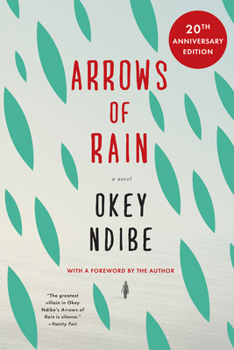Arrows of Rain
Select Format
Select Condition 
Book Overview
In Nigerian novelist and journalist Okey Ndibe's powerful debut novel, living to tell the tale is not enough--you must also tell it. Twenty years after its original publication, and now with a new Foreword by the author, Arrows of Rain remains a vital exploration of the importance of story in opposition to corruption and the steep cost of speaking truth to power.
"A story that must be told never forgives silence."...
Format:Paperback
Language:English
ISBN:1641293012
ISBN13:9781641293013
Release Date:October 2020
Publisher:Soho Press
Length:312 Pages
Weight:0.90 lbs.
Dimensions:0.8" x 5.6" x 8.3"
Customer Reviews
2 ratings
Stories that must be told
Published by Thriftbooks.com User , 21 years ago
A friend who teaches a course in modern fiction told me about Okey Ndibe's novel. I went to a local bookstore and ordered it. Turned out to be the best book I've read in years!This guy can tell a story, and tell it in a lyrical, compelling style. Often, when I read some highly touted novel, I pray for the book to come to an end. In the case of Arrows of Rain, I read it in one breathless go, and felt saddened when I turned to the last pages.Ndibe's story is set in Madia, a fictional African nation, but the story resonates with the human experience. As somebody who's lived in two African nations, I found his evocation of the African atmosphere quite peerless in any novel I've read that's set in Africa. But the greater power of this novel lies in Mr. Ndibe's probing of the nature of power, stories and memory. The absolutely most stunning line in this beautiful novel is a statement by one of the female characters: "A story that must be told never forgives silence." In a sense, the whole novel revolves around that idea: the consequences of silence when we should speak; the way in which the powerful dread stories, and the absolute need to reinforce memories. Arrows of Rain is that rare novel--at once a love story, a psychological and political thriller, and a story engaged with ideas. No discerning reader who encounters this book is going to emerge from reading it without having his sensibility transformed. The story stays with you long after you've closed the book. And it is a book that, as I found out, richly rewards re-reading. I thought to attempt a summary of the book's plot, but no! It's too engaging a book to be reduced to a quick plot summary. I've been looking for more stuff by this guy, but can't find any. I hope he continues to write--and write powerfully. There are more stories that must be told!Bill Curtis
Arrows of Rain, an outstanding debut
Published by Thriftbooks.com User , 23 years ago
Arrows of Rain published by Heinemann in the year 2000, is Okey Ndibe's first novel. Having read it, one is inclined to agree with Ekwueme Mike Thelwell that Arrows of Rain is 'an ambitious and brave first novel...(that) could jump start the moral political mission of serious African literature begun so well by Ousmane, Ngugi, and the immortal Achebe.' It deals with the degeneration of a contemporary African Nation, Madia, and the betrayal of its people by a corrupt political dictatorship.Ndibe uses investigative journalistic and memoir techniques to closely examine and expose the disintegration of values and ethos in both public and private life; and how the lack of moral vision is leading the post-independent African society and its people at a hurtling pace towards destruction. The corruption, decadence and violence Ndibe vividly depicts in this novel are reminiscent of earlier writings by other African writers. A Man of the People and Anthills of the Savannah by Achebe, The Interpreters and The Man Died (prison memoirs) by Soyinka, The Beautyful Ones Are Not Yet Born by Armah, Petals of Blood by Ngugi and Dangerous Love by Ben Okri, are few such examples. To his credit, Ndibe is able to tackle this 'old' theme in African literature with refreshing insight and a unique approach, which lend his novel a contemporary application to the African experience.Ndibe also demonstrates a skillful handling of not only his subject matter, but also the manner and technique in which it is conveyed and delivered. Listen to Ogugua's grandmother speaking to him shortly after the death of his father: 'Your father spoke to you before he went on his journey. You did not hear him. Do you know why? Because young men of today have lost the things of old. You no longer hear the language of things not said with words. 'Your father did not follow death like a lame man. He first wanted to know that you can stand in the world like a man. You must always remember that you come from a line of speakers. Your grandfather was the town crier for all of Amawbia. Your own father...went to the whiteman's country and learned to become a new kind of voice, one that was heard far beyond Amawbia. Now you, a child of yesterday, have joined the line. You have begun to do what your father did and his father before him. What you scratch on paper can go and give a headache to a big man... 'Don't fear any man, but fear lying. Remember this: a story that must be told never forgives silence. Speech is the mouths's debt to a story...' (97) In this passage we can clearly see the rhythm and structure of the original native language captured in the English rendition of the old woman's speech. Her character is one of the best realized in the novel, even though we met her in just a couple of pages. However, I quoted this passage for yet another and more significant reason. I believe it holds the master key to our understanding of the central message of Arrows of Rain. Ogugua's gr





